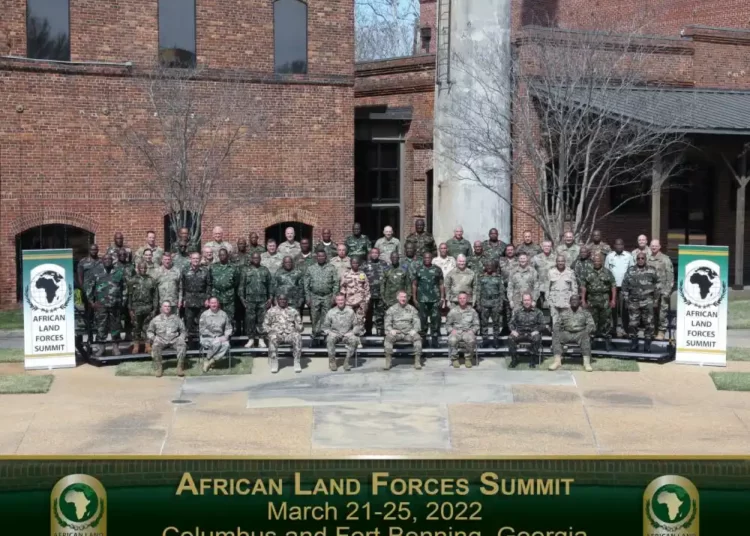Military senior leaders from the U.S. Army and over 40 African countries attended the 10th African Land Forces Summit, (ALFS) on March 21-25 in Columbus Georgia at the invitation of the United States Army from 21 to 25 Mar 2022.
The summit with the theme “Resilient Institutions Build Resilient Leaders” was hosted by the U.S. Army Chief of Staff, and is focused on strengthening partnerships and discussing security challenges impacting African land forces.
This year’s ALFS highlighted the importance of foundational elements within army and security institutions, such as training centers and non-commissioned officers.
AFLS was attended by delegates from over forty countries (mainly African) and other organizations like the United Nations and the African Union. The non African countries that attended include Brazil, Italy, Spain and the United Kingdom.
Participants took part in plenary sessions as well as observing training at Fort Benning, home of the Maneuver Center of Excellence and the United States Army’s Infantry and Armor Schools.
Also, participants were briefed on the overview of the US Army’s approach to training, Training and Doctrine Command, Security Force Assistance Brigade (SFAB) Capabilities brief, and Army Futures Command.
There were breakout sessions where the participants were divided into different discussion groups to share ideas on various topics. There were daily visits to Fort Benning ( Manouver Centre of Excellence) where participants were shown the training facility and also shown the US Army’s basic training and Airborne training which included helicopter flights for all participants. Participants were treated to demonstrations and saw the Rangers in action.
Participants also observed One Station Unit Training, the Airborne School, a live fire demonstrations, and the popular Rangers in Action demonstration.
Additionally, there was live fire from tanks, Bradley fighting vehicles, TOW missiles, and machine guns among other infantry and Armour weapons.
Maj. Gen. Chikunkha Harrison Soko, Land Forces Commander, Republic of Malawi, said this year’s ALFS contributes to the security of the African continent because it exposed partner nations to new leadership styles and training models, as well as providing a means to discuss issues affecting Africa and the world at large.
“For some of the generals who have never been here, they have seen soldiers coming in for training straight from recruitment, and they have seen progressive courses both for noncommissioned officers and for the officers,” said Soko. “This summit cannot be in a better place than Fort Benning.”
The Force Commander, Multinational Joint Task Force (FC #MNJTF) Major General Abdul Khalifah Ibrahim attended the Summit.
Major General Andrew Rohling, Commanding General for U.S. Army Southern European Task Force, Africa, closed out ALFS 22 with remarks encouraging attendees to build on the connections they’ve made at the summit, continue discussions, and to remember their common goal: a more secure, stable, and prosperous African continent.
“There is a popular saying: ‘If you want to go fast, go alone. But, if you want to go far, go together’,” said Rohling. “The United States wants to travel together. The United States Army is committed to being a trusted, dependable partner. We highly value our partnerships. We want to strengthen our partnerships and expand new ones.”
Rohling also announced the co-host and location of next year’s ALFS as Abidjan, Côte d’Ivoire, which is the first time the summit will be held in Africa since 2020.
“We look forward to planning the return of the African Land Forces Summit to the African continent in partnership with Division Gen. Aly Justin Dem and the Ivorian Armed Forces,” said Rohling. “I know it will be a great event.”
The goal of the African Land Forces Summit is to strengthen partnerships across Africa to improve regional and continent-wide security, as well as demonstrate to African partners that the U.S. is committed to their long-term success. This forum allowed for candid dialogue to discuss and develop cooperative solutions to improve transnational security and stability, and provided an opportunity for the U.S. participants to hear issues and concerns directly from African land forces commanders.


